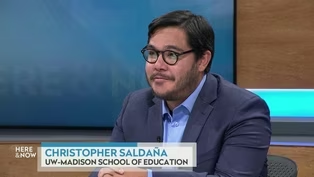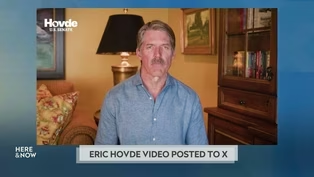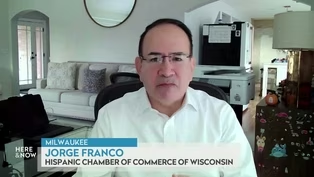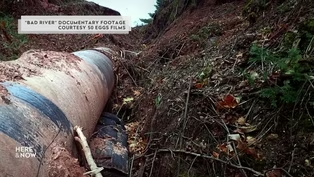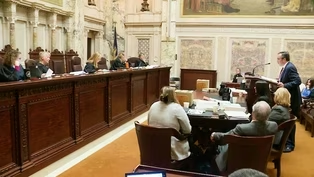Here and Now
Kathryn McGarr on Trumpism and Lessons From American History
Clip: Season 2300 Episode 2320 | 5m 20sVideo has Closed Captions
Kathryn McGarr on historical parallels between a second Trump administration and mid-20th century.
UW-Madison journalism professor Kathryn McGarr considers questions about historical parallels between the second Trump administration and the mid-20th century's America First movement and McCarthyism.
Problems playing video? | Closed Captioning Feedback
Problems playing video? | Closed Captioning Feedback
Here and Now is a local public television program presented by PBS Wisconsin
Here and Now
Kathryn McGarr on Trumpism and Lessons From American History
Clip: Season 2300 Episode 2320 | 5m 20sVideo has Closed Captions
UW-Madison journalism professor Kathryn McGarr considers questions about historical parallels between the second Trump administration and the mid-20th century's America First movement and McCarthyism.
Problems playing video? | Closed Captioning Feedback
How to Watch Here and Now
Here and Now is available to stream on pbs.org and the free PBS App, available on iPhone, Apple TV, Android TV, Android smartphones, Amazon Fire TV, Amazon Fire Tablet, Roku, Samsung Smart TV, and Vizio.
Providing Support for PBS.org
Learn Moreabout PBS online sponsorshipvery much.
Thanks for your time.
>> You're very welcome.
Federico.
Nice to be with you.
>> How does president elect Donald Trump make America great again?
There are certainly signposts, beginning with his promises of mass deportations, tariffs and America First policy like not wanting the U.S. To fund Ukraine.
And how does this MAGA movement align with days of yore?
We turn to an expert on the 1940s and 50s UW-Madison professor of journalism, Kathryn McGuire.
And thanks very much for being here.
>> Thank you for having me.
>> So what are the historical kind of parallels to current political issues in your mind loss of civil liberties?
>> There are two points for concern, I think.
The first is loss of free speech rights and free press.
And so we have a long history of passing sedition laws in this country, starting with 1798.
The alien and sedition Act, when John Adams wanted to silence his political opponents in the Democratic-Republican party.
That one lapsed.
But then again, World War One, the Woodrow Wilson administration gets another Sedition Act passed, and it's really a draconian measure to punish anyone who speaks, not just against the government, but even questioned the war effort, the draft, anything at all, and was upheld by the Supreme Court.
The second area is loss of civil liberties by minority groups.
And so one of the most significant in the 20th century would be the internment of Japanese Americans in World War two.
And Franklin Roosevelt accomplished that entirely through executive order.
So we need to remember that the president does have a lot of power and that some of this happens through Congress, and some of it happens through executive order.
>> So the America First Movement has been a populist political theory through history.
And in fact, it became Donald Trump's kind of foreign policy doctrine as president.
What does America first hold?
of the 1930s and was a movement to keep the United States out of war in Europe, and this was coming off the heels of World War One, when the United States had participated in World War One and an effort to prevent participation in World War Two.
There established an America First Committee in 1940.
It ended up disbanding after Pearl Harbor, but the sentiment never went away, and it was sort of revived as a political party here and again.
And it's really about putting American security first in foreign policy.
But the so many of the spokespeople at the time and over the years have been pro-fascist and been major cornerstones of the America First movement.
>> Small a small f. America First has been pretty much the policy of every president who puts American security first.
The capital a America first because that other part of it is already settled that the president will put first in foreign policy.
It really does seem to be more about putting a certain type of America first.
And it's a white Christian nationalist America.
>> There's been a lot of talk about Donald Trump seeking revenge against his political enemies and his words.
The enemy within.
When a historian like yourself hears those words, what kind of parallels do you see?
>> It sounds so much like the 1940s and 1950s.
The second Red scare and the Lavender Scare that came along with it.
So the Red scare is most of your viewers will know is the effort to root out communists in the federal government, but it really spread to other institutions and businesses of people lost their jobs for having just been associated with communism.
And then the Lavender Scare, which was eliminating any homosexuals from the federal government and again, spread to other institutions.
And so it's really about any kind of subversion, political subversion, or at the time, what was considered sexual subversion.
Now, Donald Trump has specifically mentioned Marxists and communists.
He talks about that a lot.
He talks about journalists as enemies of the state.
And while I don't think there would be a repeat of the lavender Scare, he certainly considers trans people to be enemies of the state.
And so I think we often see these parallels between sort of political subversion and traditional gender roles.
>> What lessons from history can we learn as we go forward?
>> I try to always remind my students of two things.
One is that history is not inevitable, and we don't know what's going to happen.
We can't predict it.
Another is that it's not linearly progressive, so we like to think of America as always progressing, people getting more rights, but rights expand and contract all the time.
And the culture expands and contracts all the time.
So we saw this most recently with reproductive rights contracting.
We're also now seeing voting rights contracting again.
So keeping in mind that we're not necessarily
Christopher Saldaña on Funding for Wisconsin Schools in 2025
Video has Closed Captions
Clip: S2300 Ep2320 | 6m 11s | Christopher Saldaña on the Department of Public Instruction's 2025 budget and referendums. (6m 11s)
Here & Now opening for November 15, 2024
Video has Closed Captions
Clip: S2300 Ep2320 | 1m 13s | The introduction to the November 15, 2024 episode of Here & Now. (1m 13s)
Hovde's Refusal to Concede to Baldwin in 2024 US Senate Race
Video has Closed Captions
Clip: S2300 Ep2320 | 1m 44s | Eric Hovde refused to concede to Tammy Baldwin, making false statements about the vote. (1m 44s)
Jorge Franco on Hispanic Voters, Trump and Mass Deportation
Video has Closed Captions
Clip: S2300 Ep2320 | 5m 31s | Jorge Franco on a swing among Latino voters toward Donald Trump and mass deportation. (5m 31s)
Line 5 Pipeline Reroute Around Bad River Land Advances
Video has Closed Captions
Clip: S2300 Ep2320 | 1m 13s | The DNR issued permits to Enbridge to reroute Line 5 around the Bad River reservation. (1m 13s)
Wisconsin Supreme Court Justices Take On an Abortion Lawsuit
Video has Closed Captions
Clip: S2300 Ep2320 | 5m | The Wisconsin Supreme Court heard a lawsuit challenging an 1849 law that banned abortion. (5m)
Providing Support for PBS.org
Learn Moreabout PBS online sponsorship
- News and Public Affairs

Top journalists deliver compelling original analysis of the hour's headlines.

- News and Public Affairs

FRONTLINE is investigative journalism that questions, explains and changes our world.












Support for PBS provided by:
Here and Now is a local public television program presented by PBS Wisconsin
